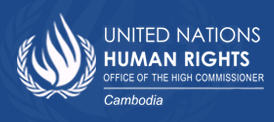
The Special Procedures of the Human Rights Council are independent human rights experts with mandates to report and advise on human rights from a thematic or country-specific perspective. The system of Special Procedures is a central element of the United Nations human rights machinery and covers all human rights: civil, cultural, economic, political, and social.
As of 27 March 2015, there are 41 thematic and 14 country mandates. So far Cambodia has received official visits only by the Special Rapporteur on the situation of human rights in Cambodia, at the exception of the Special Rapporteur on adequate housing in 2005. Several thematic mandate holders have visited Cambodia for the purpose of research or meeting with civil society organisations, but not as part of an official visit which can only take place at the invitation of the government upon request of the mandate-holder. States can also decide to issue a ‘standing invitation’ which is an open invitation extended by a Government to all thematic special procedures. By extending a standing invitation States announce that they will always accept requests to visit from all special procedures. Cambodia has not issued such a standing invitation and 14 requests for invitation from thematic special rapporteurs remain pending as of July 2015.
Special procedures are either an individual (called "Special Rapporteur" or "Independent Expert") or a working group composed of five members, one from each of the five United Nations regional groupings: Africa, Asia, Latin America and the Caribbean, Eastern Europe and the Western group. The Special Rapporteurs, Independent Experts and members of the Working Groups are appointed by the Human Rights Council and serve in their personal capacities. They undertake to uphold independence, efficiency, competence and integrity through probity, impartiality, honesty and good faith. They are not United Nations staff members and do not receive financial remuneration. The independent status of the mandate-holders is crucial for them to be able to fulfil their functions in all impartiality. A mandate-holder’s tenure in a given function, whether it is a thematic or country mandate, is limited to a maximum of six years.
With the support of the Office of the United Nations High Commissioner for Human Rights (OHCHR), Special Procedures undertake country visits; act on individual cases of alleged violations and concerns of a broader, structural nature by sending communications to States; conduct thematic studies and convene expert consultations, contributing to the development of international human rights standards ; engage in advocacy and raise public awareness ; and provide advice for technical cooperation. Special Procedures report annually to the Human Rights Council and the majority of the mandates also report to the General Assembly.
Read more on Special Procedures at http://www.ohchr.org/EN/HRBodies/SP/Pages/Introduction.aspx
Read the latest special procedures communications related to Cambodia | http://bit.ly/2HL0IME (search for Cambodia in the 'State/Entity' scroll menu, select the date range, and click on search)